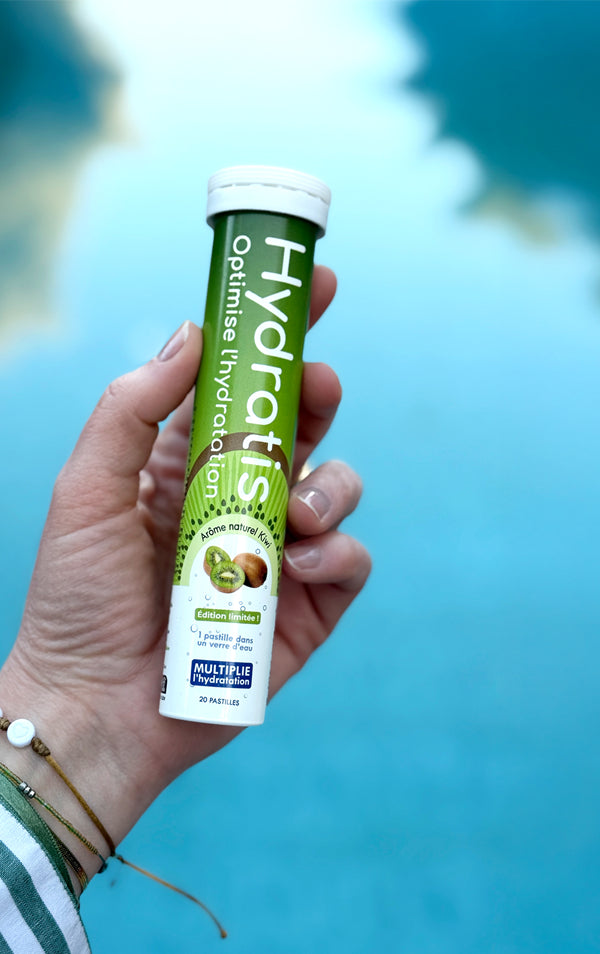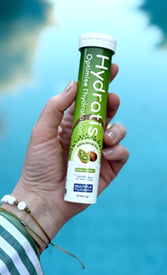Are you feeling low energy, feeling down, or craving sugar? You may be one of the 1 in 5 French people affected by seasonal depression , which occurs between the end of October and the end of March.
What causes this fatigue and how can we deal with it?
The importance of hydration in winter
And yes, hydration is one of the keys to your well-being throughout the year and even more so during cold periods! When temperatures drop, our body uses a significant amount of fluid and calories to thermoregulate the body and vital organs. Furthermore, an aggravating factor, the sensation of thirst decreases and we tend to drink less regularly and in smaller quantities! Being aware of this specific winter problem is the key to maintaining adequate energy levels.
It is important to identify the signals and symptoms sent by our body indicating a lack of hydration . Chapped lips and drier, brittle skin are a strong signal of this problem and should encourage you to pay more attention to your hydration level. In addition, the cold combined with low humidity in the air (dry weather) will promote the loss of fluids and electrolytes through perspiration and the respiratory tract (Read the article "Hot and cold climate: the impact on our hydration needs ").
Hydratis helps you optimize your hydration during these winter periods: it allows water to be absorbed and assimilated more efficiently thanks to the creation of a hypotonic drink and provides you with mineral salts and trace elements . Start the day with a Hydratis tablet in a large glass of water and add one to two tablets to a bottle during the day to drink regularly and efficiently.
Sun, vitamin D and seasonal infections
Winter fatigue can be explained in various ways, as the body has to cope with the cold, deficiencies and illnesses.
In winter, the length of the day decreases, leading to a significant drop in brightness - from 50,000 lux on a sunny day in summer to 5 times less on a winter day - and this leads to a disruption of the biological clock or otherwise known as " light deficiency".
It is the skin that, when exposed to sunlight, creates significant amounts of vitamin D.
Vitamin D plays a role in overall health, including the proper functioning of the immune system . Vitamin D deficiency can increase susceptibility to viral infections – such as respiratory infections – and with a lower immune response. [Immune Modulatory Effects of Vitamin D on Viral Infections]
On the other hand, seasonal infections - such as colds, flu, gastroenteritis - spread more easily and quickly during this time!
- Lack of sun and vitamin D weaken our immune system
- lower temperature and humidity in the air promote the stability of certain viruses
- Gatherings in closed and poorly ventilated spaces promote contamination.
In this particular year (2020 and 2021), confinement and fear of the coronavirus have limited outdoor physical activity and social interactions, which has amplified winter fatigue. However, there has been a clear reduction in seasonal infections (flu, gastroenteritis, bronchiolitis, etc.).
Circadian rhythm disruption: a cause of winter fatigue and seasonal depression
For some, this winter fatigue can lead to " seasonal depression ," called Seasonal Affective Disorder (SAD). What causes it?
The circadian rhythm
Chronobiology is a discipline that studies biological rhythms in the body. The best-known biological rhythm is the circadian rhythm - a cycle of approximately 24 hours . Almost all of our body's functions are subject to it: blood pressure, sleep, heart rate, but also memory... Our internal clock is primarily set to light and darkness.
When it is disrupted, it has an impact on our health, particularly on sleep, mood disorders, etc., and can play an important role in mood. [Chronobiology – Inserm]
Melatonin, fatigue and seasonal depression
Natural light is of course fundamental in the synchronization of the circadian rhythm because it plays an important role on melatonin. Melatonin is the sleep hormone , involved in the regulation of mood, sleep and wakefulness. The decrease in natural light perceived by the eyes leads to the secretion of this hormone, therefore to falling asleep. The increase in light perceived by our eyes leads to the end of this secretion of melatonin (around 7:30 a.m.) and therefore to waking up.
People with Seasonal Affective Disorder are affected by the shorter daylight hours in winter. They produce more melatonin during the day, which leads to constant fatigue and even symptoms of depression. [Science & Vie]
For the sake of well-being, it is important to respect your biological rhythm: get enough sleep, eat meals at fixed times, turn off screens an hour before going to sleep (their blue light gives the body the impression that it is still daytime), etc.
Tips for fighting winter fatigue?
Having a healthy lifestyle, a balanced diet and practicing regular sporting activity helps combat this phenomenon.
Expose yourself to daylight
As the winter blues are linked to the lack of daylight, it is necessary to expose yourself to it as soon as possible, at least 30 minutes a day : go out often, especially in good weather, continue to get fresh air (walking, cycling, jogging, etc.).
If you are affected by Seasonal Affective Disorder (SAD), the most appropriate treatment is phototherapy . In Scandinavian countries, where there is a custom of a lack of exposure to light, phototherapy is a common practice. [Treatment of winter depression in Norway] .
This involves exposing yourself for 30 minutes, preferably in the morning, to a light of 10,000 lux intensity. The phototherapy lamp emits a light that reproduces the spectrum of natural light and stops the production of melatonin and thus regulates the circadian cycle. [Phototherapy in the treatment and prevention of seasonal affective disorder ]
Take care of your diet
The winter blues may make you crave sugary foods and carbohydrates like chocolate, pasta, and bread, but remember to include fresh, seasonal fruits and vegetables in your diet. Foods to prioritize are those rich in vitamins C, D, and minerals .
- Acerola, lemon, kiwis, oranges, clementines, grapefruits and also sprouts (Brussels, cauliflower) are rich in vitamin C. [ANSES]
- Oily fish, such as salmon, herring, sardines and mackerel, are rich in vitamin D. [ANSES]
During the holiday season, family meals tend to be heavier and fattier, and excess food and alcohol forces the body to work harder. Make sure you stay hydrated; soups, vegetables rich in fiber and potassium, and herbal teas will help the liver flush out accumulated toxins.
Also consume foods rich in magnesium , known to boost our immune defenses : dark chocolate, nuts (walnuts, hazelnuts, almonds, cashews, pistachios, etc.) but also garlic, ginseng, ginger. [ Possible roles of magnesium on the immune system]
Dietary supplements containing vitamins, minerals, royal jelly, and propolis can be helpful. Finally, it's important to maintain good hydration and remember to drink, even in winter!
Some tips to feel good, even in winter:
- Drink enough , 6 to 8 glasses of water per day, consume herbal teas, tea... Good hydration helps prevent the appearance of dry skin.
- Take care of your skin by using moisturizing cream and balm.
- Avoid overheating the home
- Get enough sleep as it is essential to combat winter fatigue.
- Get outside for at least 30 minutes a day and enjoy the sunny spells
- Use phototherapy to combat light deficiency
- Hydrate yourself regularly with hot and cold drinks
- Adapt your diet with seasonal fruits and vegetables






